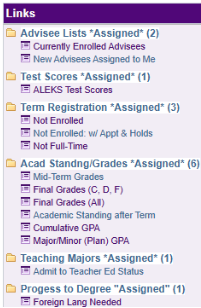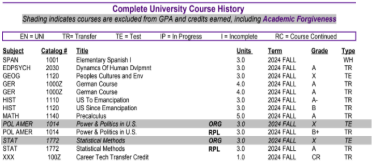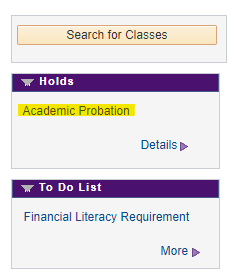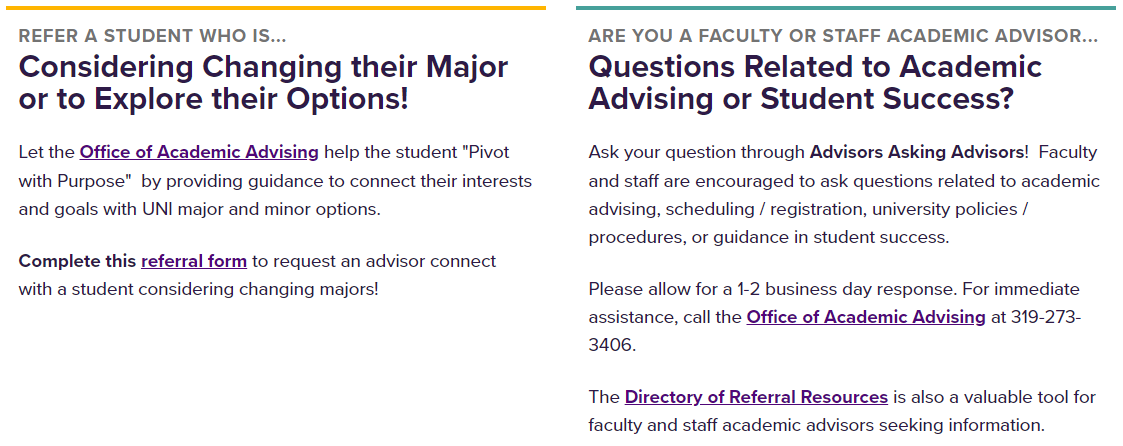Academic Advising Core Foundations Program - Session #3
This session is the third of three sessions of the Academic Advising Core Foundations program and will be offered in February 2025 during the 2024-25 academic year pilot.
Detailed (with links) Session #3 Informational Outline
 Accessing your Advisees Information
Accessing your Advisees Information- MyUniverse --> Reporting tab --> Academic Reports (My Advisees)
- For your assigned advisees
- Academic Standing/Grades
- Progress to Degree
- On the Advisement Report….
- University Requirements for Graduation
- Grade Point Average
- Calculating GPA
- GPA Calculator
- Videos for UNI Advisors: Calculating Semester GPAs | Cumulative GPAs | Repeated Courses
- Complete University Course History

- Incomplete Courses
- Fall - July 1
- Spring - December 1
- Summer - February 1
- Credit/No Credit
- Academic Forgiveness Policy (3.21)
- Repeat Courses
- The grade received the last time the student takes the course is used in the GPA calculation (even if lower than previous)
- The grade received the last time the student takes the course is used in the GPA calculation (even if lower than previous)
- Incomplete Courses
- University Requirements for Graduation
- Other Academic Policies and Procedures
- Academic Student Request
- Could include: Drop AFTER the Deadline| Semester Credit Hour Overload (>18 hours) | Course Substitution
- Approval Process
- Drop vs. Semester Withdraw
- Removing one or multiple courses from your schedule but remaining in at least one (1) course vs. removing ALL courses from your schedule for a semester
- Forms
- Undergraduate Academic Standing (Academic Alert/Probation/Suspension)

- Flowchart
- Academic Reports (My Advisees)
- Campus Solutions/SIS
- In example student was placed on academic probation in the Spring 2024 (2233) se
 mester
mester
- In example student was placed on academic probation in the Spring 2024 (2233) se
- Satisfactory Academic Progress (SAP) - Financial Aid
- Reviewed annually at the end of each spring semester
- Requirements:
- Minimum GPA: Undergraduate students must maintain a 2.0 cumulative GPA
- Pace of Progression: Students must complete at least 67% of all attempted credits at UNI. Grades of F, W, I (incomplete), NP (not passed), and NC (no credit) count as attempted but not completed and negatively impact the pace calculation.
- Maximum Time to Complete a Degree: Students must complete their degree within 150% of the credits required for their degree.
- Plan of Study
- Reverse Transfer
- Students have the option to transfer credits earned at UNI back to one of the Iowa community colleges for the purpose of completing a degree, diploma or certificate.
- If a student intends to do a "Reverse Credit Transfer" to complete an Associates of Art (AA) degree, they should complete the Reverse Transfer Credit Form (with help from community college advisor) for UNI advisors to determine the specific courses needed to complete degree.
- Graduation and Commencement
- Graduation refers to complete all degree requirements whereas commencement is the recognition event at the conclusion of a student’s academic career
- Graduation refers to complete all degree requirements whereas commencement is the recognition event at the conclusion of a student’s academic career
- Academic Student Request
- Student Success and Persistence
- Making Referrals / Connections to Information
- Try to put yourself in the students' shoes and communicate understanding.
- Think what resources are available to help with this issue and normalize the service.
- Transition from advising to other resources
- Managing Difficult Conversations/Discussion of Academic Difficulties
- Active listening, empathy, clear communication, setting boundaries, and sometimes referring the student to additional support services when necessary
- Key strategies when working with students:
- Create a safe space: Ensure privacy and a comfortable environment for student to open up.
- Active listening: Pay full attention to the student's concerns, using verbal and non-verbal cues to show engagement
- Empathy and validation: Acknowledge feelings and perspective without judgment
- Direct communication: Clearly state the issue at hand, using "I" statements to avoid blame
- Open-ended questions: Encourage student to elaborate on their situation by asking questions that require more than a yes/no answer.
- Set clear expectations: Outline responsibilities/potential consequences if issues persist
- During the conversation:
- Focus on actively listening and be open to accepting feedback and advice.
- Use collaborative language.
- Ask clarifying questions (i.e. neutral questions & supportive questions).
- Stay focused on what’s relevant to the current conversation.
- Make sure to summarize what you think you heard (i.e. “you seem to feel strongly about...” or, “if I’m understanding you correctly...”)
- Making Referrals / Connections to Information
- For Your Success...
- Session follow up email
- Weekly Academic Advisor Email
- Office of Academic Advising | 319-273-3406 | academic-advising@uni.edu
- Academic Advising Portal - Advisors Asking Advisors | Major Changer Referral Form

